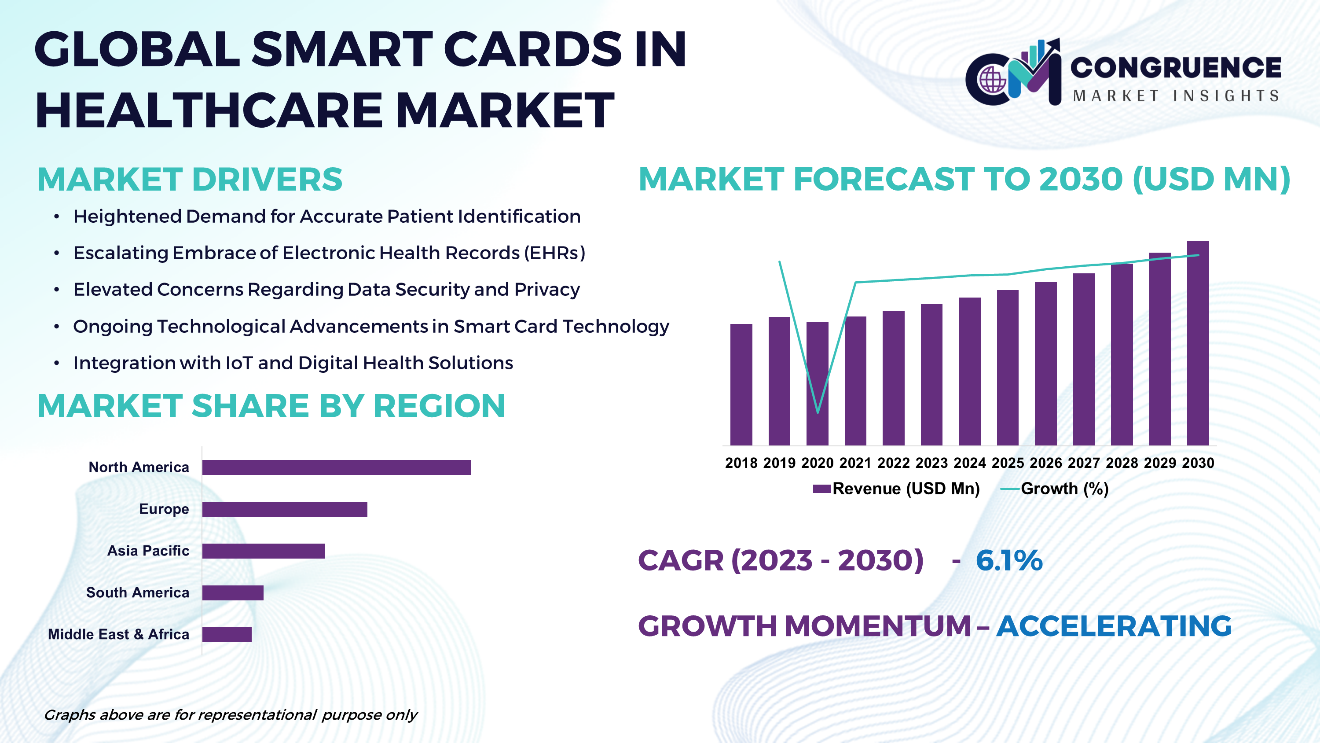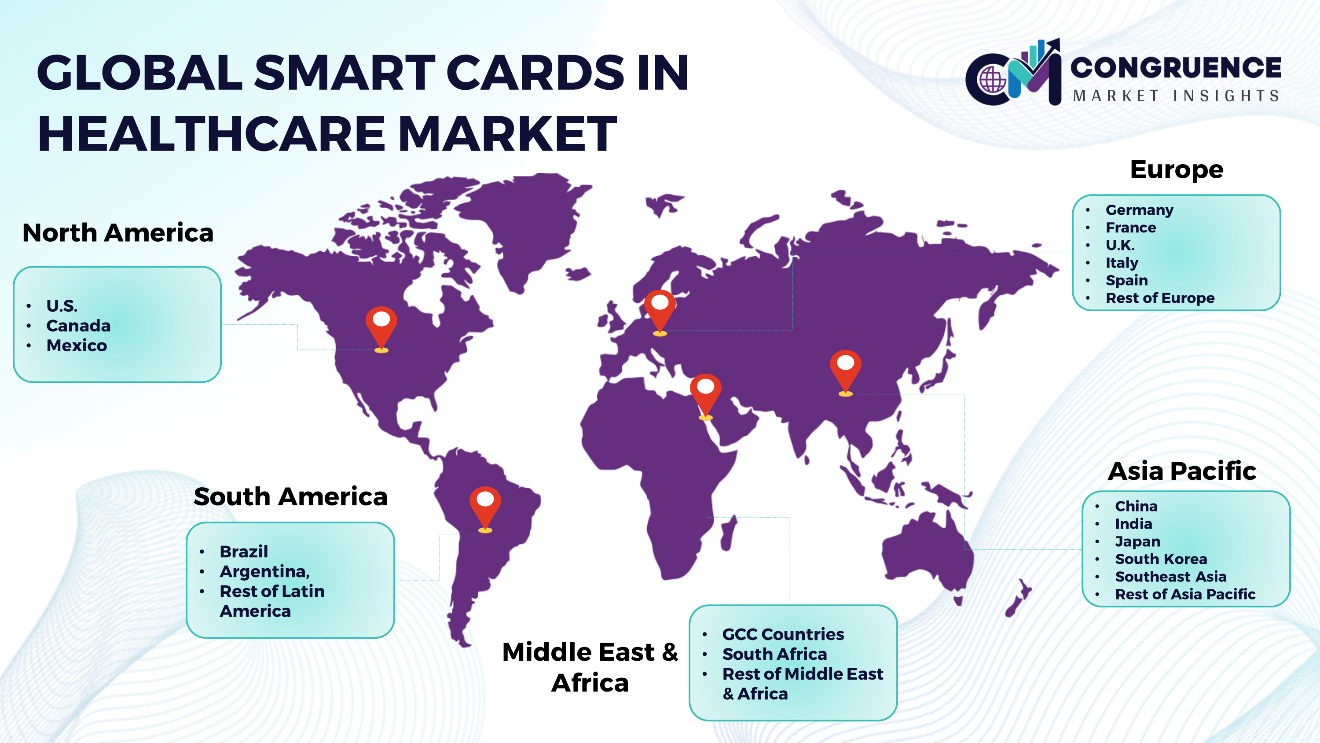Reports
The Global Smart Cards in Healthcare Market is expected to expand at a CAGR of 6.1% between 2023 and 2030. The integration of smart cards into healthcare has ushered in a new era of efficiency and security in patient data management and healthcare service accessibility. These cards, equipped with microprocessors and memory chips, securely store critical medical information such as patient demographics, medical history, and insurance particulars. The market landscape for smart cards in healthcare is experiencing consistent growth, propelled by the widespread adoption of electronic health records (EHRs), governmental initiatives aimed at digitizing healthcare systems, and the imperative for streamlined patient identification and authentication processes. Technological advancements in smart card technology, including biometric authentication, near-field communication (NFC) capabilities, and sophisticated encryption algorithms, have bolstered security and interoperability, facilitating seamless integration with existing healthcare IT infrastructure.

Smart Cards in Healthcare Market Major Driving Forces
Heightened Demand for Accurate Patient Identification: The escalating necessity for precise and expedient patient identification within healthcare facilities, such as hospitals and clinics, spurs the demand for smart card solutions, which furnish secure access to patient information.
Escalating Embrace of Electronic Health Records (EHRs): The transition from paper-based medical records to electronic health records (EHRs) necessitates reliable and secure means of storing and retrieving patient data, thereby driving the adoption of smart cards as a secure repository.
Elevated Concerns Regarding Data Security and Privacy: Heightened apprehensions regarding data breaches and identity theft in healthcare settings underscore the appeal of smart cards, which offer advanced encryption and authentication features, ensuring the safeguarding of patient information.
Ongoing Technological Advancements in Smart Card Technology: Continual progressions in smart card technology, encompassing features such as biometric authentication, near-field communication (NFC), and contactless payment functionalities, augment the functionality and usability of smart cards in healthcare applications.
Integration with IoT and Digital Health Solutions: Integration of smart cards with Internet of Things (IoT) devices and digital health solutions facilitates seamless data exchange and interoperability, enabling the provision of remote patient monitoring, telehealth services, and personalized healthcare delivery.
Smart Cards in Healthcare Market Key Opportunities
Expansion of Electronic Health Records (EHRs): The ongoing shift toward electronic health records provides a platform to integrate smart cards for secure data storage and access, enhancing operational efficiency and interoperability.
Telemedicine and Remote Healthcare: The expanding telemedicine sector presents opportunities to utilize smart cards for secure patient identification, remote consultations, and access to virtual care platforms.
Enhanced Patient Engagement: Smart cards offer avenues to empower patients with access to their health information, appointment scheduling, medication reminders, and telehealth services, fostering improved patient engagement and treatment adherence.
Integration with Digital Health Solutions: Opportunities exist to integrate smart cards with digital health platforms, wearables, and IoT devices for seamless data exchange, remote monitoring, and personalized healthcare delivery.
Smart Cards in Healthcare Market Key Trends
· Within healthcare settings, there is a burgeoning preference for contactless smart cards, largely driven by considerations of hygiene and imperative infection control measures.
· The integration of smart card functionalities into mobile devices empowers patients to access health information and conduct transactions conveniently via smartphones or tablets, augmenting overall accessibility and user experience.
· Integration of biometric authentication technologies, such as fingerprint or iris scanning, with smart cards is gaining momentum as a means to fortify security and deter unauthorized access to patient data.
· Smart cards are being seamlessly integrated with Internet of Things (IoT) devices to facilitate remote monitoring of patient health data, medication adherence, and environmental parameters within healthcare facilities.
· Paramount importance is placed on adhering to interoperability standards to ensure smooth data exchange between smart cards and healthcare information systems, ultimately fostering enhanced care coordination and superior patient outcomes.
· Implementation of advanced encryption algorithms and robust authentication protocols is underway to safeguard sensitive patient information stored on smart cards against unauthorized access and cyber threats.

Market Competition Landscape
In the competitive arena of the market, providers strive for distinction through technological innovation, excellence in service delivery, and customer satisfaction. Amidst rigorous regulatory mandates and evolving client expectations, companies prioritize the delivery of holistic solutions and strategic partnerships to secure competitive advantage and broaden their market footprint. Key objectives include maximizing operational efficiency, ensuring adherence to regulatory standards, and offering value-added services tailored to the diverse needs of healthcare entities.
Key players in the global Smart Cards in Healthcare market implement various organic and inorganic strategies to strengthen and improve their market positioning. Prominent players in the market include:
· Infineon Technologies AG
· Thales
· STMicroelectronics NV
· SAMSUNG
· Microchip Technology Inc.
· Guoxin Micro
· Onsemi
· Toshiba Infrastructure Systems & Solutions Corporation
· Analog Devices, Inc.
· Sony Corporation
· Intel Corporation
· Identiv, Inc.
· Watchdata
· The Swatch Group Ltd.
· KONA I Co., Ltd.
· Shanghai Fudan Microelectronics Group Co., Ltd.
· Texas Instruments Incorporated
|
Report Attribute/Metric |
Details |
|
Base Year |
2022 |
|
Forecast Period |
2023 – 2030 |
|
Historical Data |
2018 to 2022 |
|
Forecast Unit |
Value (US$ Mn) |
|
Key Report Deliverable |
Revenue Forecast, Growth Trends, Market Dynamics, Segmental Overview, Regional and Country-wise Analysis, Competition Landscape |
|
Segments Covered |
· By Type (Contact-Based, Contactless, and Hybrid) · By Application (Patient Identification, Payment and Billing, Access Control and Security, and Healthcare Data Storage) · By End User (General Hospitals, Private Hospitals and Others) |
|
Geographies Covered |
North America: U.S., Canada and Mexico Europe: Germany, France, U.K., Italy, Spain, and Rest of Europe Asia Pacific: China, India, Japan, South Korea, Southeast Asia, and Rest of Asia Pacific South America: Brazil, Argentina, and Rest of Latin America Middle East & Africa: GCC Countries, South Africa, and Rest of Middle East & Africa |
|
Key Players Analyzed |
Infineon Technologies AG, Thales, STMicroelectronics NV, SAMSUNG, Microchip Technology Inc., Guoxin Micro, Onsemi, Toshiba Infrastructure Systems & Solutions Corporation, Analog Devices, Inc., Sony Corporation, Intel Corporation, Identiv, Inc., Watchdata, The Swatch Group Ltd., KONA I Co., Ltd., Shanghai Fudan Microelectronics Group Co., Ltd., and Texas Instruments Incorporated |
|
Customization & Pricing |
Available on Request (10% Customization is Free) |
